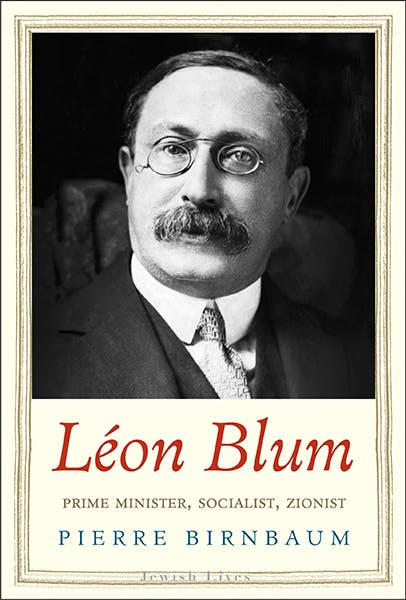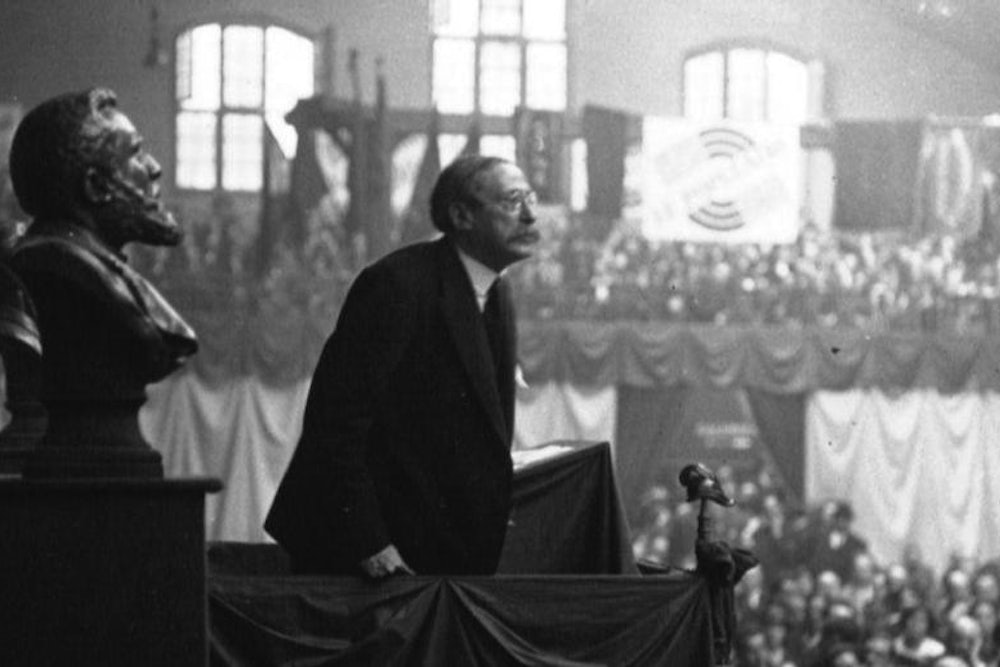No portrait of Léon Blum,” Pierre Birnbaum posits in a new biography, “can ignore the essential fact of his Jewishness.” And of course this is true. Compared to other prominent Jewish statesmen in Europe, Blum—both as leader of the high-minded but doomed Front Populaire and France’s prime minister in the late 1930s—is an important exception. The British Prime Minister Benjamin Disraeli was born to Jewish parents but was baptized as a Christian when he was 13 years old. Walter Rathenau, the Jewish-born Foreign Minister of Weimar Germany, remained tormented by his identity throughout his life. Unlike them, Blum was the first Jewish public leader, not only in France but in the modern world, who proudly affirmed his heritage, even in times of confounding anti-Semitism.

Birnbaum’s brief but insightful book—instructively subtitled “Prime Minister, Socialist, Zionist”—is the latest in the “Jewish Lives” series from Yale University Press, and, indeed, Birnbaum’s emphasis is on Blum’s evolving experience as a Jew in the nightmare of the twentieth century: his political awakening during Dreyfus, the torrent of anti-Semitism he faced in interwar France as the human face of socialism, his deportation to Buchenwald under the Nazi Occupation, and, finally, his postwar embrace of Zionism. “This man of uncommon talent tried to reconcile his Jewishness with his passion for government and his embrace of democratic norms,” Birnbaum tells us. Blum’s Jewishness, in other words, is thus the proverbial red thread that stitches together the complexities of his public and private lives.
But was Blum’s socialism largely a function of his Jewishness, as Birnbaum writes? Or was it the expression of a complex, far more abstract sensibility, a profound humanity shaped by both Frenchness and Jewishness in equal measure?
As a young man what Léon Blum had wanted to be was a writer. Born in 1872 in the working class Rue Saint-Denis, Blum came of age on the periphery of fin de siècle Paris, idolizing the willful, socially ambitious heroes of Stendhal’s novels, the Julien Sorels and the Lucien Leuwens. Perhaps to emulate these men of action, the decidedly effete would-be writer even fought a duel that was captured on film—he nearly skewered his opponent—and he wrote an admiring biography of Stendhal, the man who apparently had all the answers. But if he worshipped Stendhal, Blum himself was closer to a character from a Huysmans novel. In his twenties, he was an aesthete, animated more by the allure of art and the beguiling excesses of high flying literary salons than he was by the technicalities of politics.
His literary affinities sometimes brought strange bedfellows, and, for a time, the younger Blum was an avowed devotee of Maurice Barrès, the writer and right-wing activist who invented the term “National Socialist” and who would later decry the presence of Jews like Blum in France. Blum couldn’t ignore politics for long. The Dreyfus Affair of the late 1890s changed his life: France was rocked by this unprecedented social drama, and so was Blum, who, for years, labored to exonerate Alfred Dreyfus, the Jewish military captain wrongfully accused of treason. The realm of French politics was transformed and so was Léon Blum. In his Souvenirs sur l’Affaire, Blum recalled his relationship with Barrès, but very critically. The two men were never on speaking terms again.
Now a socialist and a disciple of Jean Jaurès—perhaps modern France’s most influential socialist forefather—Blum never disavowed his literary past. He had written, for instance, a scandalous book on marriage and divorce in 1907, which he republished in 1936 and which was translated into English in 1937. Du mariage was a paean to sexual desire; its central contention was that happy marriages could only occur if both husbands and wives had been allowed to “sow their wild oats” before standing at the altar. Largely thanks to his own amorous extramarital exploits, the young aesthete had finally become a proper Stendhalian, a man of action. After the Dreyfus Affair, he irreversibly moved from spectatorship to sport, from decadence to consequence, and from salons to high politics. In 1914, just as the First World War broke out, Blum was the assistant to Marcel Sembat, the socialist Minister of Public of works; by 1919, he took a seat in the National Assembly and chaired the socialist party’s executive committee. His career would only advance from there.
In many respects, there is no one better than Pierre Birnbaum to track this development: he is among the most distinguished historians of the Jews in modern France. His landmark 1992 study, Les Fous de la République, introduced the term “Juif d’État”—the “state Jew” who, especially after the establishment of the Third Republic in 1870, turned to careers in civil service to celebrate the French Republic. Likewise, his subsequent publications explored the rise of anti-Semitism in the French fin de siècle, the Dreyfus Affair, and, most recently, what he dubbed France’s “new anti-Semitic moment,” the 2014 jours de colère, the climate of collective malaise that saw, once again, the reemergence of anti-Jewish tropes in public. In January of that year, hundreds marched through the streets of Paris chanting “Juif, la France n’est pas à toi” ("Jew, France does not belong to you.").
Blum’s life, naturally, fits quite well into many of these discourses, old and new alike. The young Blum pursued a path of educated assimilation typical of Birnbaum’s “state Jew.” In 1890, he passed the notoriously difficult entrance exam for the prestigious École Normale Supérieure, which enabled him to join the exclusive ranks of France’s intellectual establishment and, most importantly, its political mandarinate. All throughout, Blum maintained a dual belief in the Enlightenment promise of the French state as well as a commitment to a Jewish life. “In the great tradition of state Jews,” Birnbaum writes, “Blum thus saw the state historically as an instrument of emancipation.” And it was the French state’s emancipatory character, Birnbaum suggests, that ultimately informed Blum’s passionate embrace of socialism: the French Revolution had emancipated French Jews, and now, more than a century later, a French Jew would emancipate the masses.
By the 1920s, Blum had developed a very specific—and decidedly French—view of the state: a view that blended certain elements of the centralized bureaucracies of Louis XIV and Napoleon, with the Hegelian idea that civil servants were ultimately custodians of the public good. A disciple of Jaurès, Blum never considered socialism, as Trotsky and Lenin later would, as a revolutionary rejection of bourgeois society. It was the opposite, the promise of improvement within that society. As he wrote in À l’échelle humaine: “the power of the state should be used to define, protect, and guarantee the condition of the working class.” The age-old absolutist refrain of “L’état, c’est moi” had become “L’état, c’est nous,” a stage on which to effect a truly collective transformation.
Linking, as Birnbaum does, these sentiments with Blum’s Jewishness is a complicated enterprise indeed. To be sure, Blum’s Jewish experience played a prominent role in the formation of his political consciousness, but whether it was the dominant influence on his ideas and policies has yet to be convincingly shown. In office, Blum emphasized his Frenchness over his Jewishness: “My ancestors are purely French,” he wrote in 1938 in response to an anti-Semitic attack, repeated even in the venerable pages of the Petit Larousse, that his real name had been Karfulkenstein. For the Jewish community, Blum’s election to Prime Minister was not necessarily a sign of communal vindication: “In a few days, when he is head of government,” wrote L’Univers Israélite in 1936, “our claims on and duties toward him will be no greater than those of any other spiritual family in France.”
The same intricate nuance applies to Blum’s elusive relationship to Zionism, of which Birnbaum makes a great deal—perhaps too much. As is well known, France’s elite Jewish political establishment was historically hostile to Zionism. Paris’s Central Consistory, along with the Alliance israélite universelle, rejected the ideas of Herzl, who advocated the establishment of a Jewish state in Palestine. For many in these circles, Zionism, at least as Herzl later articulated it, was a deep existential challenge to the carefully cultivated symbiosis they had sought to achieve between Frenchness and Jewishness.
Although Birnbaum situates Blum on the vague periphery of this milieu, he nevertheless credits his subject with having “singlehandedly tried to transform the relationship between French Judaism and Zionism.” This is an overstatement for which there is very little evidence. Blum was undoubtedly supportive of the Zionist project, but in the grand tradition of Edmond de Rothschild, Bernard Lazare, and André Spire, men who themselves would never have dreamed of leaving their beloved France but who saw in a Jewish return to Palestine the prospect of a sustainable future for their stateless, Eastern European brethren. This was a version of philanthropic, nineteenth-century Zionism, and, for Blum, an extension of the socialist project and its emancipatory capacities. Birnbaum’s emphasis on Blum’s relationship with Chaim Weizmann or his defense of the establishment of the State of Israel in 1948 depicts Blum as an unwavering supporter, which he undoubtedly was, but not quite as the “singlehanded” warrior. “I heartily wish you success in your splendid efforts to build a Jewish state based on social justice,” Blum wrote to David Ben-Gurion in May 1948. This, in essence, was Blum’s view of Zionism: a cause dear to his heart, but a cause attuned to the lives of others in a distant land.
In the end, Birnbaum’s book—brief, eloquent, and beautifully translated by Arthur Goldhammer—is nevertheless a valuable introduction and guide to one of the most important, if overlooked, figures in the history of modern France and, indeed, modern Europe. What most remember about Léon Blum are the historical events in which he was a crucial actor, for better or worse. He is heralded for his undying fidelity to the cause of social justice, just as he is criticized for his regrettable acceptance of the Munich Accords in 1938 and his failure to provide adequate support for the Republicans in the Spanish Civil War. In that sense, Birnbaum’s book is a useful intervention: it renders a portrait of Blum’s inner life, of the hidden variables that pushed and pulled a character who found himself, for a moment in time, on the frontlines of world history.
